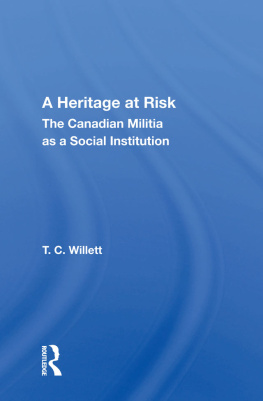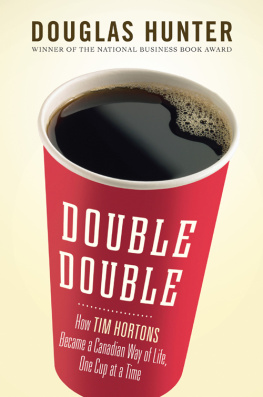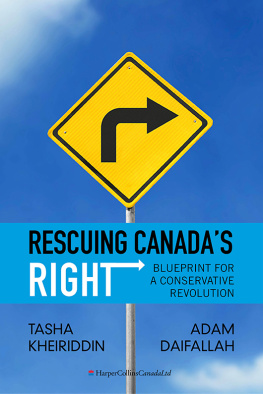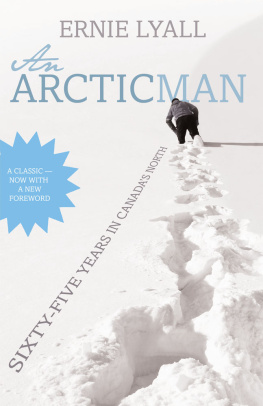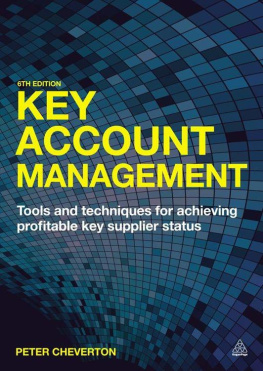Peter C. Newman - The Canadian Establishment
Here you can read online Peter C. Newman - The Canadian Establishment full text of the book (entire story) in english for free. Download pdf and epub, get meaning, cover and reviews about this ebook. year: 2014, publisher: McClelland & Stewart, genre: Detective and thriller. Description of the work, (preface) as well as reviews are available. Best literature library LitArk.com created for fans of good reading and offers a wide selection of genres:
Romance novel
Science fiction
Adventure
Detective
Science
History
Home and family
Prose
Art
Politics
Computer
Non-fiction
Religion
Business
Children
Humor
Choose a favorite category and find really read worthwhile books. Enjoy immersion in the world of imagination, feel the emotions of the characters or learn something new for yourself, make an fascinating discovery.

- Book:The Canadian Establishment
- Author:
- Publisher:McClelland & Stewart
- Genre:
- Year:2014
- Rating:4 / 5
- Favourites:Add to favourites
- Your mark:
- 80
- 1
- 2
- 3
- 4
- 5
The Canadian Establishment: summary, description and annotation
We offer to read an annotation, description, summary or preface (depends on what the author of the book "The Canadian Establishment" wrote himself). If you haven't found the necessary information about the book — write in the comments, we will try to find it.
The Canadian Establishment — read online for free the complete book (whole text) full work
Below is the text of the book, divided by pages. System saving the place of the last page read, allows you to conveniently read the book "The Canadian Establishment" online for free, without having to search again every time where you left off. Put a bookmark, and you can go to the page where you finished reading at any time.
Font size:
Interval:
Bookmark:
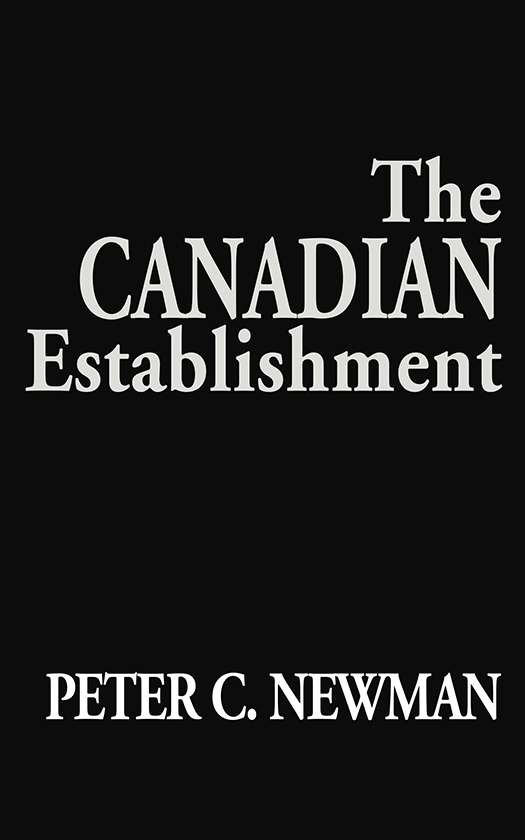
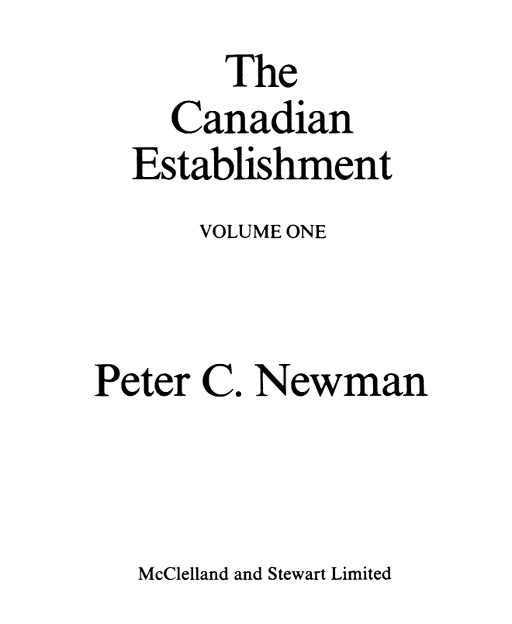
1975, Peter C. Newman
ALL RIGHTS RESERVED
No part of this book may be
reproduced in any form
including photocopying
without permission in
writing from the publishers,
except by a reviewer who may
quote brief passages in a
magazine or newspaper or
on radio or television.
Hardcover ISBN: 978-0-7710-6755-6
eBook ISBN: 978-1-55199-690-5
The Canadian Publishers
McClelland and Stewart Limited
25 Hollinger Road
Toronto, Ontario M4B 3G2
v3.1
For my daughter, Ashley,
who knows why
Flame of Power
Intimate profiles of Canadas
greatest businessmen
1959
Renegade in Power
The Diefenbaker Years
1963
The Distemper of Our Times
Canadian politics in transition: 1963-1968
1968
Home Country
People, places, and power politics
1973
The Canadian Establishment
Volume One
1975
I thought that my invincible power
would hold the world captive,
leaving me in a freedom undisturbed.
Thus night and day I worked at the chain
with huge fires and cruel hard strokes.
When at last
the work was done,
I found that it held me in its grip.
Rabindranath Tagore
Anonymity is all too often the price of candour, and since some of my research involved off-the-record discussions, acknowledgements by name of all my sources is not possible. Where no printed origin is indicated in the text, quotations are from my on-the-record interviews.
This book bears the imprint, as does everything I have written or ever will write, of the long happy apprenticeship I served under the late Ralph Allen, my mentor and friend. I am most grateful to Lloyd Hodgkinson, the publisher of Macleans, for allowing me the freedom and opportunity to write this book, although neither its tone nor its contents bears the sanction of Maclean-Hunter Limited.
Martin Lynch, the immensely knowledgeable assistant news editor of the Toronto Globe and Mail and Janet Craig, McClelland and Stewarts editor, have been invaluable companions during the long and sometimes painful creation of this book. Their wise counsel and inspiration, their dedication to detail, accuracy, and, I am sure, exasperating attempts to correct my use of an adopted language, have left me with a greater debt than I can describe or repay. I wish to thank Arlene Arnason, my assistant, for her warm-hearted and unflagging help in every phase of the manuscripts preparation.
The appreciation in which I hold Jack McClelland is very much more than the lively sense of obligation a writer feels for his publisher. His imaginative support kept this project alive through the many difficulties that continually threatened its survival. My gratitude must also encompass Stan Kenton and his music for providing some badly needed exhilaration and cadence during the pre-dawn hours when I did my writing.
This book owes its existence to many others not mentioned here; only the responsibility for its imperfections is fully my own.
| April 1, 1969 August 31, 1975 | P.C.N |
The books that will eventually make up this series of probes into the Canadian Establishment should be read as parts of one integrated work. The first volume deals mostly with Canadas business Establishment, this countrys dominant and dominating elite. The overwhelming influence of U.S. investment and American culture on Canada; the workings of government and its interface with the private sector; the rise of the Jewish Establishment; a delineation of the legal professions growing clout; the curious role of the press lords these and many other essential themes will be explored in subsequent volumes.
This first volume in a journalists attempt to analyse the workings of the Canadian Establishment grew out of some six hundred interviews and half a dozen years of research and observation.
Before this project began, I spent more than a decade on various writing assignments in Ottawa and saw that slumbering town transformed. National politics, which had been the great national yawn during the King-St. Laurent era, became the countrys leading spectator sport. At the time, along with every other power-conscious inhabitant of the capital, I was quite certain the universe, at least the part of it unfolding over that thirteenth of the earths surface which is Canada, was centred on Parliament Hill and that nothing very significant or interesting ever happened in the hinterland.
Visiting business executives men familiar with the smell of cigars, who sat around the Rideau Club managing somehow to look a trifle bewildered and pompously ingratiating at the same time seemed in their appearance and message to be the emissaries of some alien mercantile order. The senior power, I was sure, would always reside in politics, not business, conferred by revocable mandate rather than entrenched position.
More or less by coincidence, I moved to Toronto just as the conflict between the private and public sectors began to manifest itself more openly, with the men who occupy the corporate board rooms challenging political power and finding themselves challenged in return. I started to move around in the republic of business, a stranger in a strange land, meeting the men who work in large corner offices at the top of large corner buildings where the furniture is antique and so are the secretaries, as befits the breeding and importance of the occupants, even when they turn out to be hard-edged American multinational buccaneers who have nothing to do with being quietly classy and everything to do with the ethics of Genghis Khan.
I began to meet the heads of large corporations and even larger banks, men who were secretive, strong-minded, short-haired, puritanical, uptight, and yet somehow good-natured in their arrogance and often compellingly interesting. I found that most of them inhabited not merely a different climate from ordinary men but almost a different meteorology.
My fascination grew as I learned to discern the subtle differences between wealth and power, between influence and control. A few of the individuals I met were friendly, most of them engrossing, all of them cagey. Having previously confined their limited dealings with journalists to public relations departments, they regarded me with a mixture of the traditional British attitude toward the press (blackguards with their eyes to the keyhole) and the much freer American approach (buddies at the bar where the whiskey of the powerful flows). Since I seemed to fit into neither category, I was treated warily but not excluded entirely from their confidence. Many of the men I saw had never granted an open session to a journalist before.
By choice and by necessity, I laboured on the other side of the barricades from my subjects. I am grateful for their indulgence, but I do not expect they will endorse my findings.
In researching and organizing this book, I have not tried to fit the Canadian Establishment into any quantitative sociological categories. Recognizing the validity of the concept that power resides in various elites, I have concentrated instead on trying to define and detail their qualitative workings, origins, interconnections, rivalries, styles of operation. No bloodless audit of the Establishments common strains, this is a journalists tentative exploration of its members essences, flaws, values, strengths, and motives who they are, what they do, and how they get away with it.
Font size:
Interval:
Bookmark:
Similar books «The Canadian Establishment»
Look at similar books to The Canadian Establishment. We have selected literature similar in name and meaning in the hope of providing readers with more options to find new, interesting, not yet read works.
Discussion, reviews of the book The Canadian Establishment and just readers' own opinions. Leave your comments, write what you think about the work, its meaning or the main characters. Specify what exactly you liked and what you didn't like, and why you think so.


